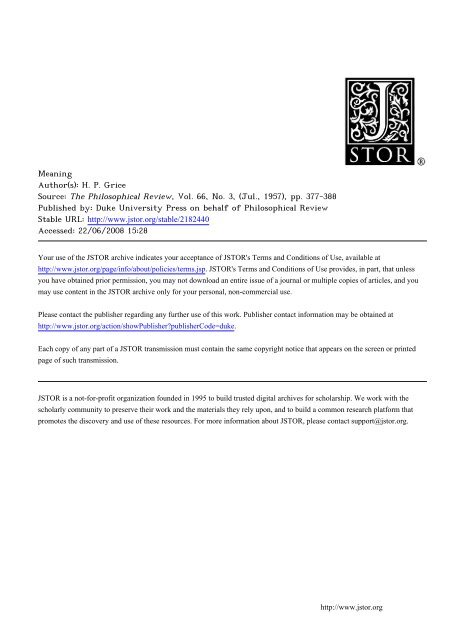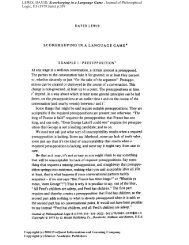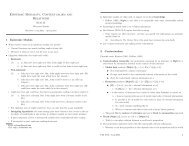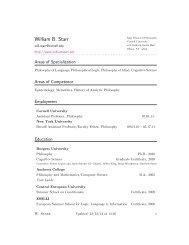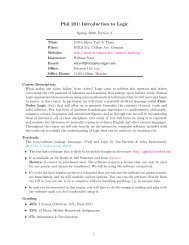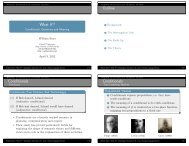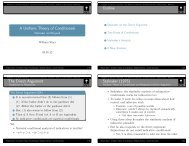Meaning Author(s): H. P. Grice Source: The Philosophical ... - Will Starr
Meaning Author(s): H. P. Grice Source: The Philosophical ... - Will Starr
Meaning Author(s): H. P. Grice Source: The Philosophical ... - Will Starr
You also want an ePaper? Increase the reach of your titles
YUMPU automatically turns print PDFs into web optimized ePapers that Google loves.
<strong>Meaning</strong><br />
<strong>Author</strong>(s): H. P. <strong>Grice</strong><br />
<strong>Source</strong>: <strong>The</strong> <strong>Philosophical</strong> Review, Vol. 66, No. 3, (Jul., 1957), pp. 377-388<br />
Published by: Duke University Press on behalf of <strong>Philosophical</strong> Review<br />
Stable URL: http://www.jstor.org/stable/2182440<br />
Accessed: 22/06/2008 15:28<br />
Your use of the JSTOR archive indicates your acceptance of JSTOR's Terms and Conditions of Use, available at<br />
http://www.jstor.org/page/info/about/policies/terms.jsp. JSTOR's Terms and Conditions of Use provides, in part, that unless<br />
you have obtained prior permission, you may not download an entire issue of a journal or multiple copies of articles, and you<br />
may use content in the JSTOR archive only for your personal, non-commercial use.<br />
Please contact the publisher regarding any further use of this work. Publisher contact information may be obtained at<br />
http://www.jstor.org/action/showPublisher?publisherCode=duke.<br />
Each copy of any part of a JSTOR transmission must contain the same copyright notice that appears on the screen or printed<br />
page of such transmission.<br />
JSTOR is a not-for-profit organization founded in 1995 to build trusted digital archives for scholarship. We work with the<br />
scholarly community to preserve their work and the materials they rely upon, and to build a common research platform that<br />
promotes the discovery and use of these resources. For more information about JSTOR, please contact support@jstor.org.<br />
http://www.jstor.org
MEANING<br />
CONSIDER the following sentences:<br />
"Those spots mean (meant) measles."<br />
"Those spots didn't mean anything to me, but to the<br />
doctor they meant measles."<br />
"<strong>The</strong> recent budget means that we shall have a hard<br />
year.'"<br />
(i) I cannot say, "Those spots meant measles, but he hadn't<br />
got measles," and I cannot say, "<strong>The</strong> recent budget means that<br />
we shall have a hard year, but we shan't have." That is to say,<br />
in cases like the above, x meant that p and x means that p entail p.<br />
(2) I cannot argue from "Those spots mean (meant) measles"<br />
to any conclusion about "what is (was) meant by those spots";<br />
for example, I am not entitled to say, "What was meant by<br />
those spots was that he had measles." Equally I cannot draw from<br />
the statement about the recent budget the conclusion "What is<br />
meant by the recent budget is that we shall have a hard year."<br />
(3) I cannot argue from "Those spots meant measles" to any<br />
conclusion to the effect that somebody or other meant by those<br />
spots so-and-so. Mutatis mutandis, the same is true of the sentence<br />
about the recent budget.<br />
(4) For none of the above examples can a restatement be<br />
found in which the verb "mean" is followed by a sentence or<br />
phrase in inverted commas. Thus "Those spots meant measles"<br />
cannot be reformulated as "Those spots meant 'measles' " or<br />
as "Those spots meant 'he has measles.' "<br />
(5) On the other hand, for all these examples an approximate<br />
restatement can be found beginning with the phrase "<strong>The</strong> fact<br />
that ... ."; for example, "<strong>The</strong> fact that he had those spots meant<br />
that he had measles" and "<strong>The</strong> fact that the recent budget was<br />
as it wa? means that we shall have a hard year."<br />
Now contrast the above sentences with the following:<br />
"Those three rings on the bell (of the bus) mean that the<br />
'bus is full.'"<br />
377
H. P. GRICE<br />
"That remark, 'Smith couldn't get on without his trouble<br />
and strife,' meant that Smith found his wife indispensable."<br />
(i) I can use the first of these and go on to say, "But it isn't<br />
in fact full-the conductor has made a mistake"; and I can use<br />
the second and go on, "But in fact Smith deserted her seven<br />
years ago." That is to say, here x means that p and x meant that p<br />
do not entail p.<br />
(2) I can argue from the first to some statement about "what<br />
is (was) meant" by the rings on the bell and from the second to<br />
some statement about "what is (was) meant" by the quoted<br />
remark.<br />
(3) I can argue from the first sentence to the conclusion that<br />
somebody (viz., the conductor) meant, or at any rate should have<br />
meant, by the rings that the bus is full, and I can argue analogously<br />
for the second sentence.<br />
(4) <strong>The</strong> first sentence can be restated in a form in which the<br />
verb "mean" is followed by a phrase in inverted commas, that is,<br />
"Those three rings on the bell mean 'the bus is full.'" So also<br />
can the second sentence.<br />
(5) Such a sentence as "<strong>The</strong> fact that the bell has been rung<br />
three times means that the bus is full" is not a restatement of the<br />
meaning of the first sentence. Both may be true, but they do not<br />
have, even approximately, the same meaning.<br />
When the expressions "means,'' "means something," "means<br />
that" are used in the kind of way in which they are used in the<br />
first set of sentences, I shall speak of the sense, or senses, in which<br />
they are used, as the natural sense, or senses, of the expressions in<br />
question. When the expressions are used in the kind of way in<br />
which they are used in the second set of sentences, I shall speak<br />
of the sense, or senses, in which they are used, as the nonnatural<br />
sense, or senses, of the expressions in question. I shall use the<br />
abbreviation "meansNN" to distinguish the nonnatural sense or<br />
senses.<br />
I propose, for convenience, also to include under the head of<br />
natural senses of "mean" such senses of "mean" as may be<br />
exemplified in sentences of the pattern "A means (meant) to<br />
do so-and-so (by x)," where A is a human agent. By contrast, as<br />
the previous examples show, I include under the head of non-<br />
378
MEANING<br />
natural senses of "mean" any senses of "mean" found in sentences<br />
of the patterns "A means (meant) something by x" or "A means<br />
(meant) by x that...." (This is overrigid; but it will serve as an<br />
indication.)<br />
I do not want to maintain that all our uses of "mean" fall<br />
easily, obviously, and tidily into one of the two groups I have<br />
distinguished; but I think that in most cases we should be at<br />
least fairly strongly inclined to assimilate a use of "mean" to one<br />
group rather than to the other. <strong>The</strong> question which now arises<br />
is this: "What more can be said about the distinction between the<br />
cases where we should say that the word is applied in a natural<br />
sense and the cases where we should say that the word is applied<br />
in an nonnatural sense?" Asking this question will not of course<br />
prohibit us from trying to give an explanation of "meaning,,"<br />
in terms of one or another natural sense of "mean."<br />
This question about the distinction between natural and nonnatural<br />
meaning is, I think, what people are getting at when<br />
they display an interest in a distinction between "natural" and<br />
"conventional" signs. But I think my formulation is better. For<br />
some things which can meanNN something are not signs (e.g., words<br />
are not), and some are not conventional in any ordinary sense<br />
(e.g., certain gestures); while some things which mean naturally<br />
are not signs of what they mean (cf. the recent budget example).<br />
I want first to consider briefly, and reject, what I might term a<br />
causal type of answer to the question, "What is meanings<br />
??"<br />
We might try to say, for instance, more or less with C. L.<br />
Stevenson,' that for x to meanNN something, x must have (roughly)<br />
a tendency to produce in an audience some attitude (cognitive<br />
or otherwise) and a tendency, in the case of a speaker, to be<br />
produced by that attitude, these tendencies being dependent on<br />
"an elaborate process of conditioning attending the use of the<br />
sign in communication."2 This clearly will not do.<br />
(i) Let us consider a case where an utterance, if it qualifies at<br />
all as meaningNN something, will be of a descriptive or informative<br />
kind and the relevant attitude, therefore, will be a cognitive one,<br />
Ethics and Language (New Haven,<br />
2<br />
Ibid., P- 57-<br />
I 944), ch. iii.<br />
379
H. P. GRICE<br />
for example, a belief. (I use "utterance" as a neutral word to<br />
apply to any candidate for meaningNN; it has a convenient actobject<br />
ambiguity.) It is no doubt the case that many people have<br />
a tendency to put on a tail coat when they think they are about<br />
to go to a dance, and it is no doubt also the case that many<br />
people, on seeing someone put on a tail coat, would conclude<br />
that the person in question was about to go to a dance. Does<br />
this satisfy us that putting on a tail coat meansNN that one is<br />
about to go to a dance (or indeed meansNN anything at all)?<br />
Obviously not. It is no help to refer to the qualifying phrase<br />
"dependent on an elaborate process of conditioning. . . ." For<br />
if all this means is that the response to the sight of a tail coat being<br />
put on is in some way learned or acquired, it will not exclude<br />
the present case from being one of meaningsN. But if we have to<br />
take seriously the second part of the qualifying phrase ("attending<br />
the use of the sign in communication"), then the account of<br />
meaningN is obviously circular. We might just as well say,<br />
"X has meaning., if it is used in communication," which, though<br />
true, is not helpful.<br />
(2) If this is not enough, there is a difficulty-really the same<br />
difficulty, I think-which Stevenson recognizes: how we are<br />
to avoid saying, for example, that "Jones is tall" is part of what<br />
is meant by "Jones is an athlete," since to tell someone that Jones<br />
is an athlete would tend to make him believe that Jones is tall.<br />
Stevenson here resorts to invoking linguistic rules, namely, a<br />
permissive rule of language that "athletes may be nontall." This<br />
amounts to saying that we are not prohibited by rule from speaking<br />
of "nontall athletes." But why are we not prohibited? Not<br />
because it is not bad grammar, or is not impolite, and so on, but<br />
presumably because it is not meaningless (or, if this is too strong,<br />
does not in any way violate the rules of meaning for the expressions<br />
concerned). But this seems to involve us in another circle.<br />
Moreover, one wants to ask why, if it is legitimate to appeal<br />
here to rules to distinguish what is meant from what is suggested,<br />
this appeal was not made earlier, in the case of groans, for example,<br />
to deal with which Stevenson originally introduced the<br />
qualifying phrase about dependence on conditioning.<br />
A further deficiency in a causal theory of the type just<br />
38o
MEANING<br />
expounded seems to be that, even if we accept it as it stands, we<br />
are furnished with an analysis only of statements about the standard<br />
meaning, or the meaning in general, of a "sign." No provision<br />
is made for dealing with statements about what a particular<br />
speaker or writer means by a sign on a particular occasion (which<br />
may well diverge from the standard meaning of the sign); nor is<br />
it obvious how the theory could be adapted to make such provision.<br />
One might even go further in criticism and maintain that the<br />
causal theory ignores the 'fact that the meaning (in general) of a<br />
sign needs to be explained in terms of what users of the sign do<br />
(or should) mean by it on particular occasions; and so the latter<br />
notion, which is unexplained by the causal theory, is in fact the<br />
fundamental one. I am sympathetic to this more radical criticism,<br />
though I am aware that the point is controversial.<br />
I do not propose to consider any further theories of the "causaltendency"<br />
type. I suspect no such theory could avoid difficulties<br />
analogous to those I have outlined without utterly losing its<br />
claim to rank as a theory of this type.<br />
I will now try a different and, I hope, more promising line.<br />
If we can elucidate the meaning of<br />
and of<br />
"x meantNN something (on a particular occasion)" and<br />
"x meantNN that so-and-so (on a particular occasion)"<br />
"A meantNN something by x (on a particular occasion)" and<br />
"A meantNN by x that so-and-so (on a particular occasion),"<br />
this might reasonably be expected to help us with<br />
"x meansNN (timeless) something (that so-and-so),"<br />
"A meansNN (timeless) by x something (that so-and-so),"<br />
and with the explication of "means the same as," "understands,"<br />
"entails," and so on. Let us for the moment pretend that we have<br />
to deal only with utterances which might be informative or<br />
descriptive.<br />
A first shot would be to suggest that "x meantNN something"<br />
would be true if x was intended by its utterer to induce a belief<br />
in some "audience" and that to say what the belief was would<br />
be to say what x meantNN. This will not do. I might leave B's<br />
38i
H. P. GRICE<br />
handkerchief near the scene of a murder in order to induce the<br />
detective to believe that B was the murderer; but we should<br />
not want to say that the handkerchief (or my leaving it there)<br />
meantNN anything or that I had meantNN by leaving it that B was<br />
the murderer. Clearly we must at least add that, for x to have<br />
meantNN anything, not merely must it have been "uttered" with<br />
the intention of inducing a certain belief but also the utterer must<br />
have intended an "audience" to recognize the intention behind<br />
the utterance.<br />
This, though perhaps better, is not good enough. Consider the<br />
following cases:<br />
(i) Herod presents Salome with the head of St. John the<br />
Baptist on a charger.<br />
(2) Feeling faint, a child lets its mother see how pale it<br />
is (hoping that she may draw her own conclusions and help).<br />
(3) I leave the china my daughter has broken lying around<br />
for my wife to see.<br />
Here we seem to have cases which satisfy the conditions so far<br />
given for meanings . For example, Herod intended to make<br />
Salome believe that St. John the Baptist was dead and no doubt<br />
also intended Salome to recognize that he intended her to believe<br />
that St. John the Baptist was dead. Similarly for the other cases.<br />
Yet I certainly do not think that we should want to say that we<br />
have here cases of meaningNN.<br />
What we want to find is the difference between, for example,<br />
"deliberately and openly letting someone know" and "telling"<br />
and between "getting someone to think" and "telling."<br />
<strong>The</strong> way out is perhaps as follows. Compare the following two<br />
cases:<br />
(i) I show Mr. X a photograph of Mr. r displaying undue<br />
familiarity to Mrs. X.<br />
(2) I draw a picture of Mr. r behaving in this manner and<br />
show it to Mr. X.<br />
I find that I want to deny that in (i) the photograph (or my<br />
showing it to Mr. X) meantNN anything at all; while I want to<br />
assert that in (2) the picture (or my drawing and showing it)<br />
382
MEANING<br />
meantNN something (that Mr. r had been unduly unfamiliar),<br />
or at least that I had meantNN by it that Mr. r had been unduly<br />
familiar. What is the difference between the two cases? Surely<br />
that in case (i) Mr. X's recognition of my intention to make him<br />
believe that there is something between Mr. r and Mrs. X is<br />
(more or less) irrelevant to the production of this effect by the<br />
photograph. Mr. X would be led by the photograph at least to<br />
suspect Mrs. X even if instead of showing it to him I had left it<br />
in his room by accident; and I (the photograph shower) would<br />
not be unaware of this. But it will make a difference to the effect<br />
of my picture on Mr. X whether or not he takes me to be intending<br />
to inform him (make him believe something) about Mrs. X, and<br />
not to be just doodling or trying to produce a work of art.<br />
But now we seem to be landed in a further difficulty if we<br />
accept this account. For consider now, say, frowning. If I frown<br />
spontaneously, in the ordinary course of events, someone looking<br />
at me may well treat the frown as a natural sign of displeasure.<br />
But if I frown deliberately (to convey my displeasure), an onlooker<br />
may be expected, provided he recognizes my intention, still to<br />
conclude that I am displeased. Ought we not then to say, since<br />
it could not be expected to make any difference to the onlooker's<br />
reaction whether he regards my frown as spontaneous or as<br />
intended to be informative, that my frown (deliberate) does not<br />
meanNN anything? I think this difficulty can be met; for though<br />
in general a deliberate frown may have the same effect (as regards<br />
inducing belief in my displeasure) as a spontaneous frown, it can<br />
be expected to have the same effect only provided the audience<br />
takes it as intended to convey displeasure. That is, if we take<br />
away the recognition of intention, leaving the other circumstances<br />
(including the recognition of the frown as deliberate),<br />
the belief-producing tendency of the frown must be regarded as<br />
being impaired or destroyed.<br />
Perhaps we may sum up what is necessary for A to mean something<br />
by x as follows. A must intend to induce by x a belief in<br />
an audience, and he must also intend his utterance to be recognized<br />
as so intended. But these intentions are not independent;<br />
the recognition is intended by A to play its part in inducing the<br />
belief, and if it does not do so something will have gone wrong<br />
383
H. P. GRICE<br />
with the fulfillment of A's intentions. Moreover, A's intending<br />
that the recognition should play this part implies, I think, that<br />
he assumes that there is some chance that it will in fact play this<br />
part, that he does not regard it as a foregone conclusion that the<br />
belief will be induced in the audience whether or not the intention<br />
behind the utterance is recognized. Shortly, perhaps, we<br />
may say that "A meantNN something by x" is roughly equivalent<br />
to "A uttered x with the intention of inducing a belief by means<br />
of the recognition of this intention." (This seems to involve a<br />
reflexive paradox, but it does not really do so.)<br />
Now perhaps it is time to drop the pretense that we have to<br />
deal only with "informative" cases. Let us start with some examples<br />
of imperatives or quasi-imperatives. I have a very avaricious<br />
man in my room, and I want him to go; so I throw a pound note<br />
out of the window. Is there here any utterance with a meaningN ?<br />
No, because in behaving as I did, I did not intend his recognition<br />
of my purpose to be in any way effective in getting him to go.<br />
This is parallel to the photograph case. If on the other hand I<br />
had pointed to the door or given him a little push, then my<br />
behavior might well be held to constitute a meaningfulNN utterance,<br />
just because the recognition of my intention would be<br />
intended by me to be effective in speeding his departure. Another<br />
pair of cases would be (i) a policeman who stops a car by standing<br />
in its way and (2) a policeman who stops a car by waving.<br />
Or, to turn briefly to another type of case, if as an examiner<br />
I fail a man, I may well cause him distress or indignation or<br />
humiliation; and if I am vindictive, I may intend this effect and<br />
even intend him to recognize my intention. But I should not be<br />
inclined to say that my failing him meantNN anything. On the<br />
other hand, if I cut someone in the street I do feel inclined to<br />
assimilate this to the cases of meaningNN, and this inclination<br />
seems to me dependent on the fact that I could not reasonably<br />
expect him to be distressed (indignant, humiliated) unless he<br />
recognized my intention to affect him in this way. (Cf., if my<br />
college stopped my salary altogether I should accuse them of<br />
ruining me; if they cut it by 2/6d I might accuse them of insulting<br />
me; with some intermediate amounts I might not know quite<br />
what to say.)<br />
384
MEANING<br />
Perhaps then we may make the following generalizations.<br />
(i) "A meantNN something by x" is (roughly) equivalent to<br />
"A intended the utterance of x to produce some effect in an<br />
audience by means of the recognition of this intention"; and we<br />
may add that to ask what A meant is to ask for a specification of<br />
the intended effect (though, of course, it may not always be<br />
possible to get a straight answer involving a "that" clause, for<br />
example, "a belief that . . .").<br />
(2) "x meant something" is (roughly) equivalent to "Somebody<br />
meantNN something by x." Here again there will be cases<br />
where this will not quite work. I feel inclined to say that (as<br />
regards traffic lights) the change to red meantNN that the traffic<br />
was to stop; but it would be very unnatural to say, "Somebody<br />
(e.g., the Corporation) meantNN by the red-light change that the<br />
traffic was to stop." Nevertheless, there seems to be some sort of<br />
reference to somebody's intentions.<br />
(3) "6x meansNN (timeless) that so-and-so" might as a first shot<br />
be equated with some statement or disjunction of statements<br />
about what "people" (vague) intend (with qualifications about<br />
"recognition") to effect by x. I shall have a word to say about<br />
this.<br />
<strong>Will</strong> any kind of intended effect do, or may there be cases<br />
where an effect is intended (with the required qualifications)<br />
and yet we should not want to talk of meaningNN? Suppose I<br />
discovered some person so constituted that, when I told him that<br />
whenever I grunted in a special way I wanted him to blush or to<br />
incur some physical malady, thereafter whenever he recognized<br />
the grunt (and with it my intention), he did blush or incur the<br />
malady. Should we then want to say that the grunt meantNN<br />
something? I do not think so. This points to the fact that for x<br />
to have meaningN,, the intended effect must be something which<br />
in some sense is within the control of the audience, or that in some<br />
sense of "reason" the recognition of the intention behind x is for<br />
the audience a reason and not merely a cause. It might look as if<br />
there is a sort of pun here ("reason for believing" and "reason<br />
for doing"), but I do not think this is serious. For though no<br />
doubt from one point of view questions about reasons for believing<br />
are questions about evidence and so quite different from questions<br />
385
H. P. GRICE<br />
about reasons for doing, nevertheless to recognize an utterer's<br />
intention in uttering x (descriptive utterance), to have a reason<br />
for believing that so-and-so, is at least quite like "having a<br />
motive for" accepting so-and-so. Decisions "that" seem to involve<br />
decisions "to" (and this is why we can "refuse to believe" and<br />
also be "compelled to believe"). (<strong>The</strong> "cutting" case needs<br />
slightly different treatment, for one cannot in any straightforward<br />
sense "decide" to be offended; but one can refuse to be<br />
offended.) It looks then as if the intended effect must be something<br />
within the control of the audience, or at least the sort of<br />
thing which is within its control.<br />
One point before passing to an objection or two, I think it<br />
follows that from what I have said about the connection between<br />
meaning,, and recognition of intention that (insofar as I am<br />
right) only what I may call the primary intention of an utterer<br />
is relevant to the meaning,, of an utterance. For if I utter x,<br />
intending (with the aid of the recognition of this intention) to<br />
induce an effect E, and intend this effect E to lead to a further<br />
effect F, then insofar as the occurrence of F is thought to be<br />
dependent solely on E, I cannot regard F as in the least dependent<br />
on recognition of my intention to induce E. That is, if (say) I<br />
intend to get a man to do something by giving him some information,<br />
it cannot be regarded as relevant to the meaning,, of<br />
my utterance to describe what I intend him to do.<br />
Now some question may be raised about my use, fairly free,<br />
of such words as "intention" and "recognition." I must disclaim<br />
any intention of peopling all our talking life with armies of<br />
complicated psychological occurrences. I do not hope to solve<br />
any philosophical puzzles about intending, but I do want briefly<br />
to argue that no special difficulties are raised by my use of the<br />
word "intention" in connection with meaning. First, there will<br />
be cases where an utterance is accompanied or preceded by a<br />
conscious "plan," or explicit formulation of intention (e.g.,<br />
I declare how I am going to use x, or ask myself how to "get<br />
something across"). <strong>The</strong> presence of such an explicit "plan"<br />
obviously counts fairly heavily in favor of the utterer's intention<br />
(meaning) being as "planned"; though it is not, I think, conclusive;<br />
for example, a speaker who has declared an intention<br />
386
MEANING<br />
to use a familiar expression in an unfamiliar way may slip into<br />
the familiar use. Similarly in nonlinguistic cases: if we are asking<br />
about an agent's intention, a previous expression counts heavily;<br />
nevertheless, a man might plan to throw a letter in the dustbin<br />
and yet take it to the post; when lifting his hand he might "come<br />
to" and say either "I didn't intend to do this at all" or "I suppose<br />
I must have been intending to put it in."<br />
Explicitly formulated linguistic (or quasi-linguistic) intentions<br />
are no doubt comparatively rare. In their absence we would<br />
seem to rely on very much the same kinds of criteria as we do<br />
in the case of nonlinguistic intentions where there is a general<br />
usage. An utterer is held to intend to convey what is normally<br />
conveyed (or normally intended to be conveyed), and we require<br />
a good reason for accepting that a particular use diverges from<br />
the general usage (e.g., he never knew or had forgotten the<br />
general usage). Similarly in nonlinguistic cases: we are presumed<br />
to intend the normal consequences of our actions.<br />
Again, in cases where there is doubt, say, about which of two<br />
or more things an utterer intends to convey, we tend to refer to<br />
the context (linguistic or otherwise) of the utterance and ask<br />
which of the alternatives would be relevant to other things he is<br />
saying or doing, or which intention in a particular situation<br />
would fit in with some purpose he obviously has (e.g., a man who<br />
calls for a "pump" at a fire would not want a bicycle pump). Nonlinguistic<br />
parallels are obvious: context is a criterion in settling<br />
the question of why a man who has just put a cigarette in his<br />
mouth has put his hand in his pocket; relevance to an obvious<br />
end is a criterion in settling why a man is running away from a<br />
bull.<br />
In certain linguistic cases we ask the utterer afterward about<br />
his intention, and in a few of these cases (the very difficult ones,<br />
like a philosopher asked to explain the meaning of an unclear<br />
passage in one of his works), the answer is not based on what he<br />
remembers but is more like a decision, a decision about how what<br />
he said is to be taken. I cannot find a nonlinguistic parallel<br />
here; but the case is so special as not to seem to contribute a vital<br />
difference.<br />
All this is very obvious; but surely to show that the criteria<br />
387<br />
7
MEANING<br />
for judging linguistic intentions are very like the criteria for<br />
judging nonlinguistic intentions is to show that linguistic intentions<br />
are very like nonlinguistic intentions.<br />
St. John's College<br />
Oxford<br />
H. P. GRICE<br />
388


